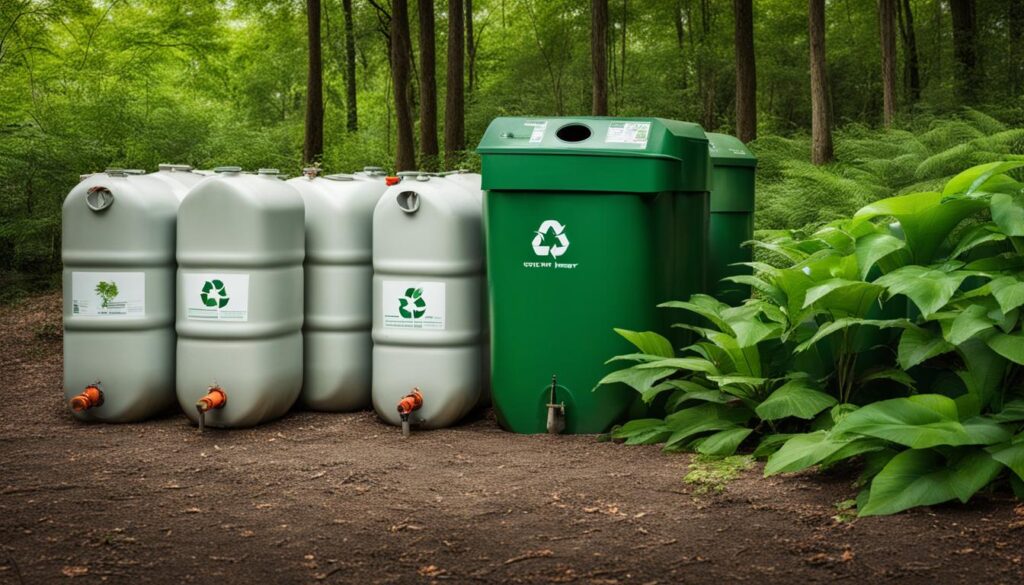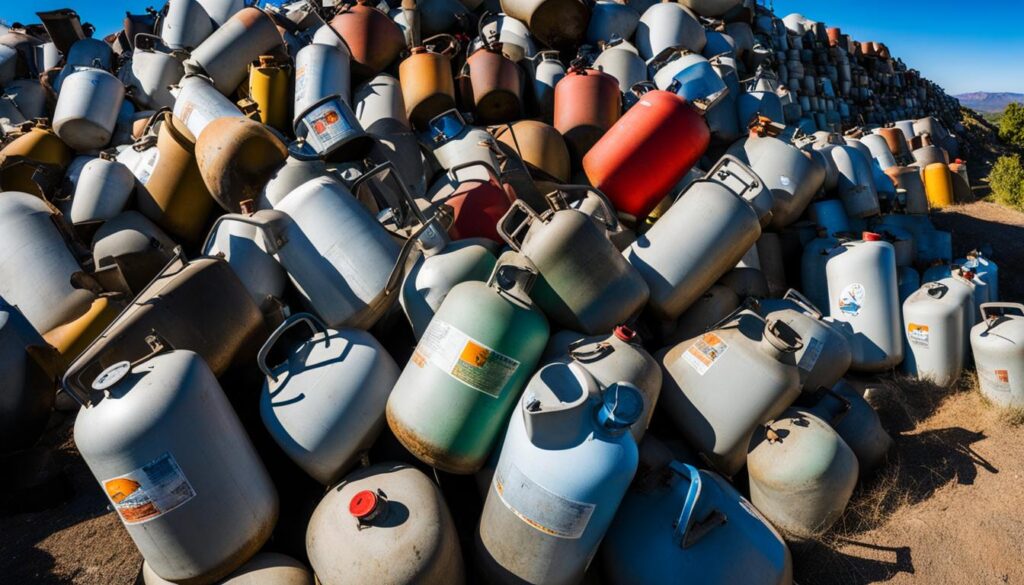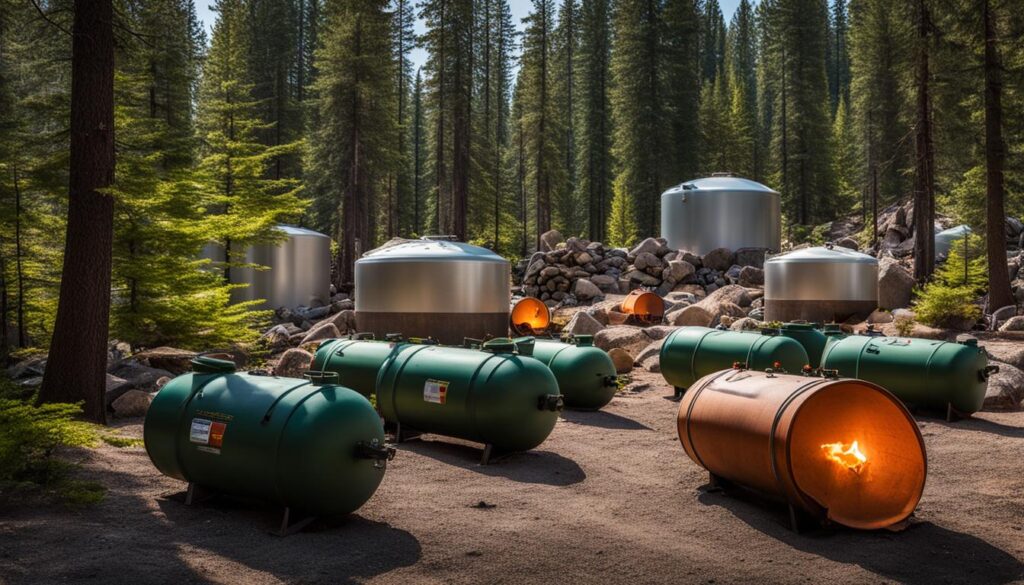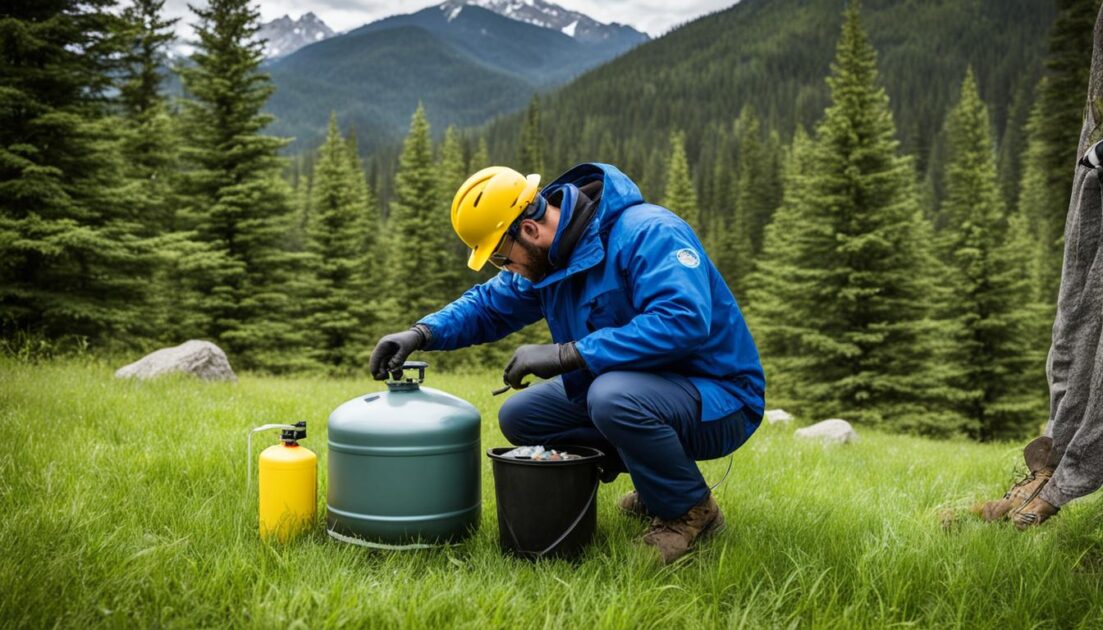As outdoor enthusiasts, many of us rely on propane as a fuel source for our camping adventures. However, the issue of what to do with the empty camping propane tanks can often be a challenge. Recycling centers may not accept them, and attempting to refill them at home can be both dangerous and illegal. Unfortunately, this has led to a significant number of propane bottles ending up in landfills, contributing to environmental pollution.
It is crucial that we find eco-friendly methods to dispose of camping propane tanks safely and responsibly. By doing so, we can protect our environment and ensure a sustainable future for outdoor activities. In this guide, we will explore the proper ways to dispose of camping propane tanks, promoting the importance of responsible propane tank disposal.
Key Takeaways:
- Proper disposal of camping propane tanks is essential to protect the environment.
- Recycling centers often do not accept camping propane tanks, leading to their disposal in landfills.
- Refilling small propane bottles at home is dangerous and illegal.
- Innovative solutions, such as the Propane Bottle Recycler (PBR), present promising alternatives for propane bottle disposal.
- Investing in small refillable tanks is a responsible solution to reduce waste and minimize environmental impact.
Understanding Propane and the Environmental Impact of Disposable Propane Bottles
Propane is a non-toxic and efficient fuel source commonly used for outdoor activities such as camping and grilling. However, the disposable one-pound propane bottles that often contain propane pose significant environmental challenges. These small bottles have a short lifespan, typically providing heat for only about an hour, before they are discarded.
Unfortunately, the disposal of these one-pound propane bottles contributes to landfill waste. In fact, it is estimated that around 5 million cubic feet of landfill space is required every year just for the disposal of these bottles. This is not only wasteful but also has long-term consequences for our environment.
It’s crucial to understand the environmental impact of disposable propane bottles and find suitable alternatives to minimize waste and promote responsible propane tank disposal. By doing so, we can make a positive impact on our environment by reducing landfill waste and conserving resources.
The Lifespan of Disposable Propane Bottles
Disposable propane bottles have a relatively short lifespan. While they may provide convenience in terms of portability, they have limited capacity and are typically used for short-term heating needs. Most of these bottles can heat food and provide heat for camping stoves or portable heaters for approximately an hour.
After their primary use, these bottles often end up in landfills, where they take up valuable space and contribute to environmental pollution. Properly disposing of them is essential to prevent further damage to our environment.
The Environmental Consequences of Disposable Propane Bottles
The improper disposal of disposable propane bottles has significant environmental consequences. These bottles are typically made of metal and can take hundreds of years to decompose in landfills. The accumulation of these bottles in landfills leads to increased waste, resource depletion, and pollution.
In addition to taking up valuable landfill space, disposable propane bottles can also be hazardous. If not disposed of properly, they can pose a threat to sanitation workers and contaminate soil and groundwater. It is crucial to find alternative methods to dispose of these bottles safely and responsibly.
Alternative Methods for Propane Tank Disposal
When it comes to the disposal of camping propane tanks, it’s important to explore alternative methods that minimize environmental impact. Proper disposal methods include recycling, repurposing, or using refillable propane tanks.
Recycling Camping Propane Tanks: Some recycling centers accept camping propane tanks for proper recycling. However, it’s important to check with your local recycling center to ensure they accept these tanks and follow their specific guidelines for preparation and disposal.
Repurposing Camping Propane Tanks: Another option is to repurpose camping propane tanks for other uses instead of disposing of them. For example, empty tanks can be used as storage containers or transformed into unique DIY projects.
Using Refillable Propane Tanks: One of the best alternatives to disposable one-pound propane bottles is to invest in a small refillable propane tank. These tanks can be refilled or exchanged at hardware stores or gas stations, reducing the need for single-use bottles and promoting responsible propane tank disposal.
Visual Representation of Propane Tank Disposal
To help visualize the environmental impact of disposable propane bottles and the importance of responsible propane tank disposal, refer to the table below:
| Disposal Method | Impact on Landfill Waste | Impact on Resources | Impact on Pollution |
|---|---|---|---|
| Disposing of disposable propane bottles in landfills | High: Contributes to landfill waste | High: Depletes resources | High: Increases pollution |
| Recycling camping propane tanks | Low: Reduces landfill waste | Moderate: Utilizes recycling processes | Low: Minimizes pollution |
| Using refillable propane tanks | Low: Minimizes landfill waste | Low: Utilizes refillable resources | Low: Minimizes pollution |
By choosing responsible propane tank disposal methods, such as recycling or using refillable tanks, outdoor enthusiasts can minimize their environmental impact and contribute to a more sustainable future.

The Risks of Refilling Small Propane Bottles and Recycling Options
While some people may attempt to refill small propane bottles from larger ones, this practice is illegal and dangerous. The Department of Transportation prohibits the transportation of refilled non-reusable propane bottles since they are not manufactured to the same standards as refillable tanks. These bottles can have thinner walls and may fail under pressure or develop leaks over time.
Recycling the bottles is another option, but it’s important to note that most recycling centers require them to be completely empty and often refuse them without clear visual confirmation. This can make it challenging to properly dispose of small propane bottles.
To better understand the risks of refilling small propane bottles and the recycling options available, let’s explore each in detail.
The Risks of Refilling Small Propane Bottles
“Transporting refilled non-reusable propane bottles is illegal and dangerous. These bottles may have thinner walls, making them prone to failure under pressure or developing leaks over time.” – Department of Transportation
Refilling small propane bottles may seem like a cost-effective solution, but it poses significant risks to personal safety and the environment. The Department of Transportation strictly prohibits the transportation of refilled non-reusable propane bottles due to their inherent hazards.
These bottles are not manufactured to the same standards as refillable tanks, and their walls may be thinner, compromising their structural integrity. Under pressure, refilled bottles can fail and cause explosions or leaks that may result in fire hazards or environmental contamination.
Recycling Options for Small Propane Bottles
Recycling small propane bottles is a responsible choice to prevent them from ending up in landfills. However, it’s essential to be aware of the specific recycling requirements and limitations.
Most recycling centers require propane bottles to be completely empty before accepting them for recycling. As these bottles are typically small and may contain residual propane, it can be challenging to ensure complete emptiness. Recycling centers often refuse partially filled or unemptied bottles due to safety concerns.
If you plan to recycle small propane bottles, it’s advisable to follow these steps:
- Ensure the propane bottle is completely empty by using the propane until it is depleted.
- Remove the valve or cap to allow for visual confirmation of emptiness.
- Contact your local recycling center to inquire about their specific recycling policies for propane bottles.
By understanding the risks associated with refilling small propane bottles and the recycling options available, you can make informed decisions to dispose of them safely, protect yourself, and contribute to a cleaner environment.

Recycling Programs and Innovative Solutions for Propane Bottle Disposal
When it comes to responsible propane tank disposal, recycling programs and innovative solutions have emerged to address the environmental impact of disposable propane bottles. Some national parks have implemented recycling programs that feature designated collection bins for separating and properly disposing of these bottles.
While these recycling programs are a step in the right direction, they require significant resources and costs to maintain. As a result, alternative solutions have been developed to alleviate the burden on parks and provide more efficient and eco-friendly propane bottle disposal methods.
One such innovative solution is the Propane Bottle Recycler (PBR). The PBR offers a safe and practical way to dispose of one-pound canisters. It punctures, drains, and crushes the empty bottles, serving as an effective recycling option. Additionally, the residual propane from the bottles is used as fuel for the recycler, making it an environmentally conscious approach.
While these innovative solutions hold promise for responsible propane tank disposal, they are not widely implemented due to financial constraints. However, it is crucial to explore and support such initiatives in order to improve propane bottle disposal methods and reduce their negative impact on the environment.
Benefits of Recycling Programs and Innovative Solutions:
- Proper disposal of propane bottles
- Reduction in landfill waste
- Potential for reusing residual propane
- Eco-friendly alternatives to single-use bottles
By expanding recycling programs and promoting innovative solutions like the Propane Bottle Recycler, we can make significant strides towards responsible propane tank disposal and contribute to a cleaner and greener environment.

| Recycling Programs | Innovative Solutions |
|---|---|
| Implemented in some national parks | Propane Bottle Recycler (PBR) |
| Designated collection bins | Safely punctures, drains, and crushes one-pound canisters |
| Require significant resources and costs | Uses residual propane as fuel |
| Minimize environmental impact | Financial constraints limit implementation |
The Refillable Solution and Responsible Propane Tank Disposal
One of the best alternatives to disposable propane bottles is to invest in a small refillable tank. These tanks, commonly found under grills, can be refilled or exchanged at hardware stores or gas stations. Exchanging an empty tank for a full one is convenient and widely available. By using refillable tanks, we reduce the need for single-use bottles and contribute to responsible propane tank disposal.
Responsible propane tank disposal is crucial for protecting the environment. By adopting refillable tanks, outdoor enthusiasts can minimize waste and environmental impact associated with disposable propane bottles. These tanks can be used repeatedly, eliminating the need to purchase and dispose of single-use bottles, which often end up in landfills.
Refillable propane tanks offer a sustainable and long-term solution for fueling outdoor adventures. Not only do they help reduce waste, but they also provide a cost-efficient way to enjoy camping, grilling, and other activities that require propane. It’s important to educate and encourage fellow outdoor enthusiasts to embrace the refillable solution and prioritize responsible propane tank disposal. Together, we can make a positive impact on the environment and enjoy our outdoor experiences with peace of mind.
FAQ
How should I dispose of camping propane tanks?
The best way to dispose of camping propane tanks is to recycle them. Some national parks have recycling programs with designated collection bins. You can also look for specialized recycling centers in your area. Make sure the tanks are completely empty before attempting to recycle them.
Can I refill small propane bottles from larger ones?
No, refilling small propane bottles from larger ones is illegal and dangerous. The Department of Transportation prohibits the transportation of refilled non-reusable propane bottles because they are not manufactured to the same standards as refillable tanks. It’s important to always use proper refillable tanks or dispose of small propane bottles responsibly.
Why is recycling small propane bottles challenging?
Recycling small propane bottles can be challenging because many recycling centers do not accept them. If you choose to recycle, make sure the bottles are completely empty and check with recycling centers in your area to see if they have specific requirements or restrictions for accepting small propane bottles.
Are there any innovative solutions for propane bottle disposal?
Yes, there are innovative solutions available, such as the Propane Bottle Recycler (PBR), which safely punctures, drains, and crushes one-pound propane canisters while using the residual propane as fuel. However, these solutions are not widely implemented due to financial constraints. It’s important to support and explore initiatives like these to improve propane bottle disposal methods.
What is the best alternative to disposable propane bottles?
The best alternative to disposable propane bottles is to invest in a small refillable tank. These tanks, commonly found under grills, can be refilled or exchanged at hardware stores or gas stations. By using refillable tanks, you reduce the need for single-use bottles and contribute to responsible propane tank disposal.

